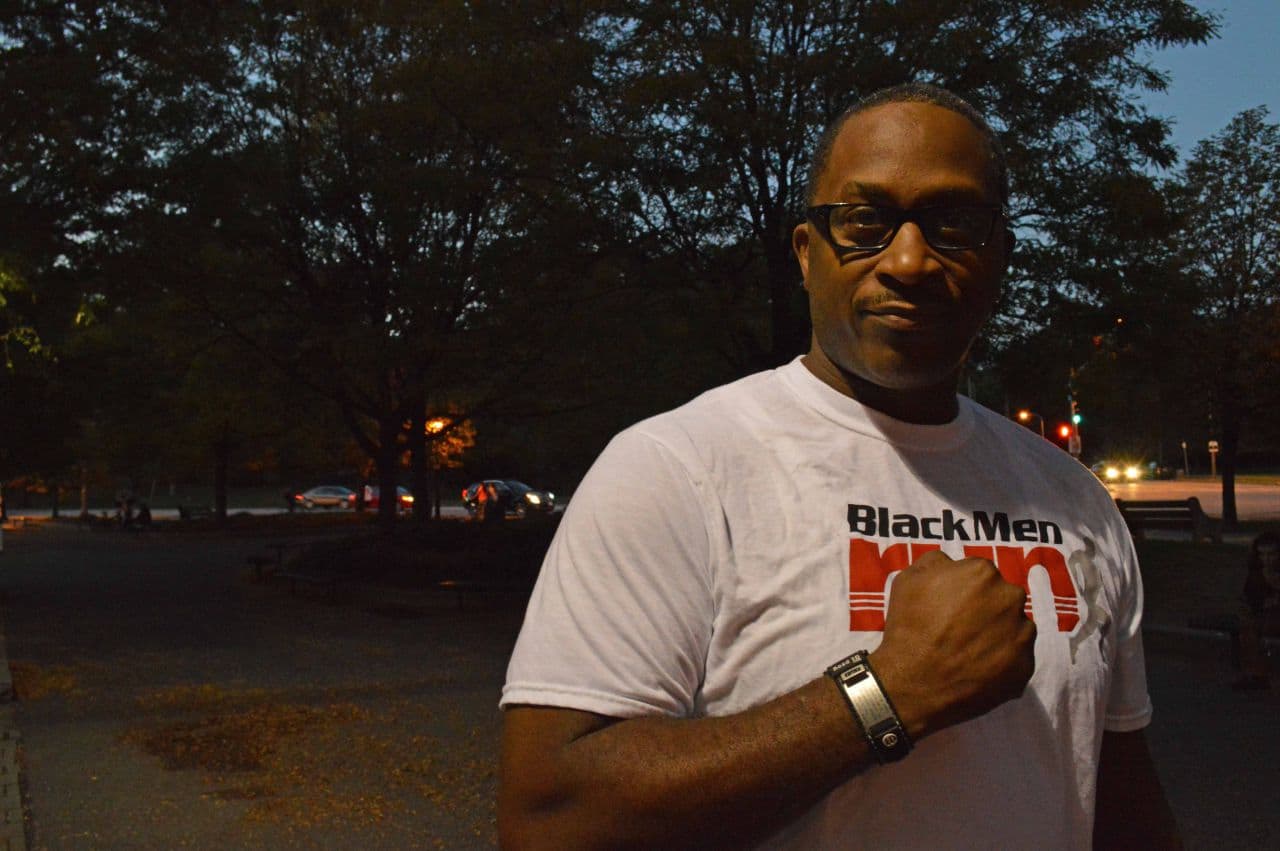Advertisement
Black Men Run: Challenging Stereotypes And Keeping In Shape
ResumeNext weekend, an estimated 50,000 runners will snake their way through the five boroughs in the New York City Marathon, the world’s largest.
If recent history is any indication, the winners on the men’s and women’s sides will likely be black athletes. East Africans, specifically, have been dominating long distance races.
But the overwhelming majority of recreational runners, so-called weekend warriors, are white. African-Americans and other minority groups continue to make up just a tiny fraction of non-elite road runners.
Todd Bookman of WHYY's "The Pulse" went running with members of a Philadelphia club looking to change that.
Each Wednesday around 7 p.m., rain or shine, they gather behind Philadelphia’s Museum of Art.
There were 15, maybe 20 runners that day, dressed like runners, talking like runners.
Everyone was wearing matching t-shirts: the words Black Men Run printed across the front.
The club got its start in Atlanta in 2013. The idea spread quickly, and there are now chapters in 50-something cities with more than 6,000 members.
Michael Stinson started running on his own a few years ago, looking to shed some weight...he’d gotten up to 330 pounds. Stinson would come down to the riverfront, put in the miles, and often find himself the only black guy.
“I came home from a run one day out here, by myself," Stinson said. "I literally came home that day, and I googled the term, 'do black men run?' Lo and behold, there is a group called Black Men Run. I didn’t know they existed. And hey, there’s a chapter in Philadelphia. And I found these guys, and a month later, bought my shirt and I was with them.”
Stinson has lost 140 pounds since he took up the sport, and he just ran the Chicago Marathon. And it’s this kind of story--one of fitness and health--that’s at the heart of the club’s mission.
Being with Black Men Run, I have a community of brothers with me that holds me accountable, and I hold them accountable for keeping us safe, keeping us healthy.
Gene Collier
African Americans have the highest rates of death caused by heart disease in the country and the highest obesity and diabetes numbers. More than anything else, Black Men Run is out to make a dent in those figures.
This was the case for runners like Joe Collins.
“I have high blood pressure," Collins said. "By running and exercising, it keeps my pressure down, I keep my weight down. Every time I see people they say, ‘Joe you lost so much weight, you look good, you look good.’ I say, ‘Thanks. Running, that’s all I do.’ This is working for me, I’m going to stick with it, baby. I’m going to stick with it!”
But along with keeping in shape, Black Men Run is also about growing the ranks.
It’s hard to know exactly how many minorities already run because road races typically don’t ask demographic questions. The best guess comes from a 2011 national survey that put the number of African American runners at 1.6 percent of the sport’s total participants. Whites made up 90 percent.
"Being with Black Men Run, I have a community of brothers with me that holds me accountable, and I hold them accountable for keeping us safe, keeping us healthy," said 47-year-old runner Gene Collier.
"And I’m never alone. I like the fact that we are all we got," Collier said. "That’s our motto: We all we got. We take care of each other, we look out for each other. But it’s not a black and white thing, because we have white guys in the group. We have girls who want to join the group.”

At this point, there’s a running club out there for nearly everyone, including Black Girls Run, White Girls Run, and Latinos In Motion.
Women swept into road running in the 70s and 80s; a lot of people in the sport see minorities as the next wave.
All night, guys like Maurice El Bueno kept saying Black Men Run isn’t about trying to exclude anyone, or turn anyone away. The name, the shirts, it’s all about outreach. It’s trying to target a community that hasn’t yet embraced the sport, that perhaps feels isolated
And it turns out, a lot of these athletes aren’t actually new to running. They just weren’t organized.
“I’ve been running since middle school," said El Bueno. "You know, I’ve had my little inconsistencies. I got shot in 2010 in the chest. That was a struggle trying to get back. You know, I had a 2-year-old at the time, and he helped me get back in shape."
"What’s the story behind getting shot?" I asked.
"Wrong place at the wrong time," El Bueno said. "Wrong place, wrong time."
"What do you think though when you show up to most runs," I asked, "there’s not a lot of African American men at these road races. It’s usually mostly white people, right?"
"It is the stereotype, black guys don’t run," he said. "You know, we play ball, run from the cops. But we actually do run without being chased by cops.”
As the run ended at the Philadelphia Museum of Art steps--the famous Rocky Steps--there’s clear evidence that runners are runners, regardless of color, shape or size.
Benjamin Footes, a 61-year-old former smoker, summed up the mood.
“I’m hurting in places I didn’t even know I have," Footes said, "for real.”
This segment aired on October 24, 2015.